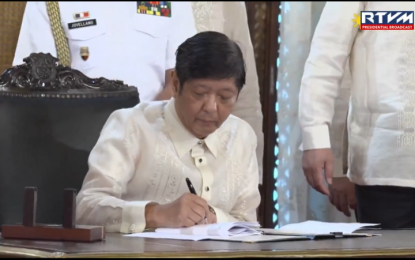
President Ferdinand "Bongbong" Marcos Jr. signs Republic Act No. 11934 also known as An Act Requiring the Registration of SIM Cards. (Screencapture of RTVM video)
MANILA – The country’s three telecommunications companies (telcos) lauded the signing of the SIM Card Registration Bill into law and noted that preparations are underway to ensure their compliance.
In a statement Monday, Globe Telecom Inc. (Globe) general counsel Froilan Castelo welcomed “a new regulatory environment” that would allow for stronger safeguards against cyber threats and other crimes using mobile phones.
“We support the passage of this measure after previous roadblocks and we are ready to comply,” Castelo said.
To date, Globe is working with the government in drafting the implementing rules and regulations (IRR) for the enforcement of the law, including the registration of millions of existing prepaid mobile users.
In a separate statement, Smart Communications Inc. (Smart) vice president and head of regulatory affairs Roy Ibay said there is a clamor from public telecommunications entities (PTE), such as Smart, to be given more time to prepare and test its systems to ensure the safety of the information that will be collected from prepaid subscribers.
“An information campaign on the SIM registration process will be launched and Smart will ensure to provide its prepaid customers a smooth and hassle-free experience upon the registry of their SIMs,” Ibay said.
He said the company is “ready” to participate in the crafting of the bill’s IRR “within the prescribed period.”
In a statement, DITO Telecommunity chief technology officer Rodolfo Santiago said the storage of biometrics data that will be used by all telcos to validate the identity of their users is “assumed” to be under the government for “security, data privacy, and resource optimization.”
“It will greatly help if both the national ID system and the passport system will be used as the validation of the identity of the subscriber,” Santiago said.
With the government handling biometrics data, he said there would be no need for telcos to establish another database to store biometrics data that would be “time-consuming and resource-heavy.”
“Everyone in DITO Telecommunity is one with the efforts of the Philippine government,” he said.
Mixed thoughts
Mobile subscribers shared mixed reactions regarding the measure's enactment.
“Para sa akin naman, maganda naman din siya, kasi meron din naman siyang good side kahit papaano at sa ngayon, laganap yung scam kasi ‘no? Nagte-text sa cellphone, minsan may mga tao na hindi aware kung ano yung kini-click nila sa mga messages…(To me, it is good because somehow it has a good side, scams are rampant these days. There are people who are not aware of what they are clicking onthe text message that they receive),” said "Ray", a working student.
Meanwhile, "Sevy", a 36-year-old SIM card vendor, said she does not see anything wrong with the law as it will only protect subscribers from scams.
Her sentiments were echoed by "Nikki", 22, student, who believes this will be a deterrent against online fraudsters.
“Sa’kin po mas better po yung ganoon since registration siya, may legal process na fina-follow and then for security purposes na rin kasi nga diba, like for example, yung SIM card na ginagamit natin sa ano, lalo na sa mga banking app, bankings, ganoon, registrations, so mas better po na ipatupad yung mga ganoon. (To me it is better to have a registration. It has a legal process that needs to be followed, for example, the SIM card that we use in our banking application, it is better to implement this)," she said.
However, "Denver", 22, a call center agent, said the effectiveness of the law and the impact of its implementation has yet to be seen.
“At first maganda siya pero kung ngayon pa nga lang, yung national ID, hindi pa nila maayos, yung mga data doon, tapos hindi pa nila mabigay yung ID, what more pa kaya kung sa SIM card registration. Kaya napakahirap ‘non kasi lahat ng data iikot na doon sa isang number para hindi magkaroon ng fraudulent activity. (At first it is good…but when it comes to National ID they cannot organize the system of the data. They can’t even provide the ID yet…what more in the registration. That’s why it is very hard as a lot of data will circulate on one number to secure that there will be no fraudulent activity),” he added.
On Monday, President Ferdinand “Bongbong” Marcos Jr. signed Republic Act 11934 also known as An Act Requiring the Registration of SIM Cards in a ceremony witnessed by Vice President Sara Duterte, lawmakers, and other government officials at Malacañan Palace.
Marcos said the law will be used to control the proliferation of various cybercrimes using mobile phones such as text scams and spam by mandating PTEs to maintain a SIM Card Registry for their subscribers. (with Anne Lorraine Bustamante and Irish Caidoy/PNA)
